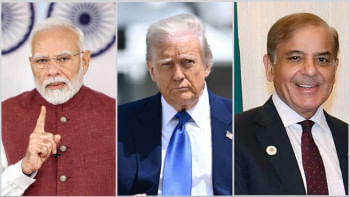Govt may support India's move to launch Saarc satellite
The government will support India's move to launch a "Saarc satellite" if its business plan and operational frequency do not conflict with the Bangabandhu-1 satellite initiated by Bangladesh, officials of the posts and telecommunications division said.
At the Saarc summit in November last year, Indian Prime Minister Narendra Modi urged member countries to join the Saarc communication satellite initiative.
The Indian High Commission also sent letters to the member countries of Saarc (South Asian Association for Regional Cooperation), asking them to support the common satellite, which will be funded, built, launched and controlled by India.
The Saarc countries will be able to use the satellite for education, health and emergency communication, according to the satellite's concept paper.
“This initiative from India is voluntary in nature and the Saarc countries are free to join this initiative,” the concept paper said.
The Saarc satellite will be launched in 18 months from Sriharikota in India, which will have a lifetime of 12 years. Meanwhile, Bangabandhu-1, which will have a lifetime of 15 years, will be launched by December 2017 at a cost of Tk 2,967 crore.
Officials of the division said they are taking preparations on the issues related to the satellite, which may come into discussion on June 6, when a bandwidth export deal will be signed during Modi's first official visit to Dhaka.
“We are not disfavouring the Saarc satellite, but we need to consider it from our perspective,” said Faizur Rahman Chowdhury, telecom secretary.
The telecom ministry recently arranged a meeting with telecom experts to discuss the issues related to the satellite, including the possibility of overlapping frequencies between the two satellites, he added.
“If the orbital position of the satellite does not conflict with our satellite, then it will be a good one for Bangladesh as an alternative communication channel.”
Bangladesh Telecommunication Regulatory Commission, in a recent letter, urged the government to form an expert panel before taking any final decision.
“We need to take time and should know its technical and business aspects from India,” said Sunil Kanti Bose, BTRC chairman. “Overlapping of frequencies may be an important issue. No decision should be taken before any technical discussion.”
The two slots are far from one another, but there could be a conflict on the issues of landing rights and frequency coordination, ministry officials said.
Bangabandhu-1 will have a capacity of 40 transponders -- one transponder is equivalent to 36 MHz. It has the ability to cover from Indonesia and the Philippines to Turkmenistan, Kyrgyzstan and Tajikistan.
The Saarc satellite will have a capacity of 12 transponders, with the ability to cover the Saarc region only, according to the concept paper.

 For all latest news, follow The Daily Star's Google News channel.
For all latest news, follow The Daily Star's Google News channel. 



Comments